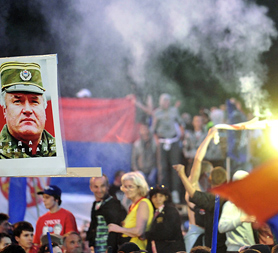Ratko Mladic appeals extradition
Former Bosnian Serb army general Ratko Mladic could be sent to The Hague within four days to face charges of genocide, yet today his lawyer appealed against his extradition.

The Mladic family and lawyer maintain the former general has suffered two strokes and is mentally unstable, thus too ill to face trial.
The appeal came as Serbian authorities detained 180 people for attacking police in a protest against his arrest.
An Interior Ministry spokeswoman said 32 police officers were injured during Sunday’s rally in Belgrade. Many of the protesters were young people, some not even born during Bosnia’s 1992-95 war. Dozens of those detained by riot police were minors.
The Serbian Radical Party, whose leader is on trial in The Hague, brought in supporters by bus from across Serbia to rally for Ratko Mladic. Many came straight from Sunday soccer matches.
During the violence, 32 police and 11 protesters were hurt, and five cars and six shops also suffered damage, police said.
Mladic, indicted for genocide in the 43-month siege of Sarajevo and the massacre of 8,000 Muslims in Srebrenica during the war, was arrested on Thursday in a village 60 miles northeast of Belgrade after 16 years on the run.
Read more: Ratko Mladic arrest - life-saving journalism?
A Belgrade court ruled on Friday he was fit enough to face genocide charges at the International Criminal Tribunal in The Hague and has served extradition papers.
His lawyer Milos Saljic has said he would appeal the extradition ruling.
Mladic’s arrest is key to Serbia’s bid for European Union candidacy and came just weeks before UN chief war crimes prosecutor Serge Brammertz was due to brief the U.N. Security Council on Serbia’s progress in the hunt for Mladic.
At the Sunday rally, Darko Mladic said his father was a defender of his people.
“Ratko Mladic is not a criminal, he did not order the killings. He defended his people in an honourable, fair and professional manner,” he told protesters.
Read more: Alex Thomson - up close and personal with General Mladic
Many Serbians agree and admire Mladic as a dedicated military man who did not seek to enrich himself during the war. But others were glad to see him arrested so that Serbia can distance itself from its international pariah status of the 1990s.
“The whole nation of eight million was being held behind because of the fate of one man, that is not right,” said a Belgrade taxi driver. “Mladic should have given himself up long ago so we did not suffer this fate.”
In Bosnia, Mladic’s supporters rallied on Sunday in the eastern town of Kalinovik where he spent his childhood.
